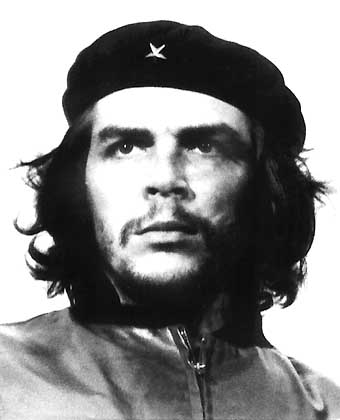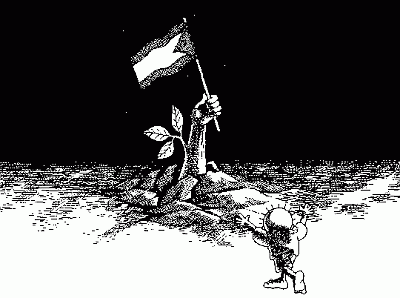Probably the most famous communist figure these days is Che Guevara. There is no place in the world that doesn’t sell Che Guevara T-Shirts (unless we are considering Saudi Arabia), mugs, posters, and least read are his books. There are plenty of documentaries, DVDs, and movies where the Che appears as a secondary or primary character. The famous front picture with the beret always appears almost in every demonstration.
But who is Che Guevara? Who is the man who inspired dreams for the oppressed, and eventually created a timeless legacy for generations to come?
The myth of Che Guevara would probably have appeared when his name appeared in the Sierra Maestra epical battle. The Cuban revolution was composed of 1000 resurgent in the face of over 15000 soldier, heavily equipped with advanced weaponry, artillery, and tanks. Almost 800 of those revolutionaries lacked the experience to fight, they were simply asking for a better life, after Cuba been a resort for the US happy bourgeoisie. The people suffered from a US satellite dictator called Batista. This is where the legacy of Che Guevara begins.

Che Guevara was the only non-Cuban (Argentinean) among Cuban militants who were present at the Granma landing, and he was the most militant organized in Guerilla Warfare. Influenced by Stalinist figures, such as Mao Tsu Tung, Kim il Sung and others, he adopted revolution as a path for the salvation of Latin America. However, not everything was Stalinists. Pablo Neruda’s thoughts and poetry inspired the Che to another path. As Stalinism preaches allegiance to Moscow (at the time) and steals revolutionary thoughts of Marxism, Che Guevara adopted their dogma without dwelling on the details of the corruption.
Che Guevara’s focal point was that the revolution is possible from the rural side, to become the spark for a mass revolution. What Che distinguished himself from the Stalinists, he believed in a better life for the proletariat. Hence, he didn’t care where he died, as long as he died fighting for the people. He advocated Internationalism as applied and hailed by Marx and Trotsky. Sadly, this was the Maoist perspective. The revolution to Engels and Lenin has its core built in the Proletariat. The Cuban revolution was led by quasi-middle class renegades who were fed up from Batista’s reign of terror. Sadly, like all forms of Stalinist revolutions, the dream would end up as a cycle of installing a dictator and annihilating the former.
When the Cuban Revolution was over, the Cuban government tried to remain neutral, and opened hands to both the Stalinist Soviets and the US. With the US angry that they lost their warden, Batista, they shut off the Castro government. They rearmed the Batista loyalists, sent them to Guatemala to shoot down an insurrection taking place brutally (of which the Poet Otto Rene Castillo died in a most brutal manner: tortured severely then burnt to death), then sent them to overthrow Castro’s rule. Nevertheless, Che Guevara was present there to organize Cuba’s defenses and the Bay of Pigs became one of the US’s greatest military miscalculated blunders. One Batista loyalist was heard complaining how the US administration sold out on them. Eventually the Cuban government sided with the Soviet Union in the cold war, since they were given no option. Cuba suffered from heavy bombardments from the US Air Force, and a lot of sugar refineries were blasted by Napalm Bombs, which is ironic because the United States criticized China for supplying the Koreans (during the Korean War) with Napalm bombs.

Che Guevara was at first thrilled for this alliance with the Soviet Union, he still didn’t figure out the difference between Stalinism and Marxism. He thought he part of extending the revolution of Lenin’s to Latin America. To say the truth, if it weren’t for Che Guevara, the Cuban Revolution wouldn’t have had its socialist feature. He was the one who read to the world the statement and position of the revolutionaries. Gradually, the revolution became dubbed Communist.
Eventually Che Guevara exploded into mass popularity. His looks, his speech capabilities, his courage, and his Utopian dreams captured the hearts of plenty through out the globe. His speech delivered at the UN and Algeria probably reflects how much he charmed his audience and how much he attempted to inspire dream against dictators.
Eventually, Guevara started dwelling in the Marxist Dogma at a later age. The Soviet Union needed Cuba as a political means to slap Kennedy’s administration in the face, and henceforth the Nuclear Missile Crisis in Cuba began. Funnier part about the crisis was that the US had missile silos allocated in Turkey, Iran, and Japan. When the Che Guevara toured the Eastern European Socialist Camp, he directly attacked the leaders of the USSR and insisted that how they called themselves as Communists while living in palaces and their people were starving. Seeing Stalinism as it is was a slap in his dreams and aspirations. He eventually attacked the USSR and its reactionary derivatives as puppets of a one man show called Stalin. Even though Stalin died, for Guevara, Stalin ruined the Bolshevik revolution. It deviated from what it was supposed to do: Emancipation of the Proletariat into a unified front against Capitalism across the globe.
Guevara severely attacked the Soviet Regime, and in parallel attacked US Imperialism. More objectively, his criticisms will be followed by brilliant critiques of US foreign policy: Noam Chomsky. His offensive style in my opinion carved way for the current scholars of anti-US imperialism. His examples, his speeches will be focal point for future generations to follow. Guevara remained Communist to the end. His trip to the Congo under disguise was an attempt to prove to both: US imperialists and Stalinist Reactionaries that the people can self-emancipate themselves by themselves.

His heavy criticism of the Soviet Union collided with Fidel Castro’s interest, which was depending on the USSR loans to survive amidst US forced embargo. Castro actually when Guevara left to lead outside revolutions exposed a letter from the Che which was preaching brotherhood to him but duty called. Castro, always a politician, preferred the games of politics rather than the emancipation of the proletariat. Che Guevara was eventually framed in the Bolivar revolution whereby it is suspected that Castro, the USSR, and the US collaborated to end Che Guevara’s existence. His revolutionary act, along with Che Tania, was blocked by all of them. The Bolivian Communist Party, upon Moscow’s orders, didn’t participate. The Bolivian government coordinated carefully with the CIA to capture Che Guevara. The proof to the matter remained that the CIA were there in less than 30 minutes after his capture to witness his execution, who to us remains called : “Martyrdom”. Che Guevara’s final words were: “I know you have come to kill me… you will only kill a man”. Certain rumors have spread that Che Guevara was carrying on his back Trotsky’s “History of the Russian Revolution”, sadly we lack the evidence if that was true. Nevertheless, he helped without noticing the Trotskyite branches by attacking Stalin and demanding the return to basic Marxism.
In current days, Che Guevara lives as a hero. Most people don’t bother what he did, sadly even some members of the Left in Lebanon believe that he was Cuban rather Argentinean. They don’t bother to know how Che Guevara had severe case of Asthma but preferred to tour Latin America on his motorcycle. They didn’t know that he was a doctor. All they know he was a cool communist. The courage of Che Guevara will remain haunting the US imperialists indefinitely. Some US neo-cons tried to compare Che Guevara to Bin Laden. Both are not related in terms of ideology, and beliefs. Che Guevara’s pictures remain to hover on every location where oppression exists. The USSR were successful to transform Guevara’s myth as a Stalinist extension but Guevara’s ideas remain. The book Guerilla Warfare remains the bulk for many paramilitary groups, but sadly a lot missed the point of this book: arming the Proletariat to be prepared of defending themselves.

In the end, Guevara believed the impossible can be achieved. His famous words were: “Be Realistic and Ask the Impossible” which compliments Connolly’s famous lines: “For our demands most moderate are,We only want the earth.”And such footsteps of courage, Guevara became a respectable Communist despite his theoretical errors at an earlier stage of life. He fixed his ideas and directly thwarted on the face of the USSR and the US Imperialists.

4 comments:
trotskyists always make it seem like Che Guevara was a trotskyist forced into a life of Marxist-Leninism because he made critiscisms of the Soviet Union. These critiscisms were critiscisms from a Marxist-Leninist prespective comrade, he was rebuking the theory of peaceful co-exsistence.
comrade which co-existence theory of them?
I am highly interested
I love your page all that talk about this character that was very revolutionary for the time helped me
I love your page all that talk about this character that was very revolutionary for the time helped me
Post a Comment